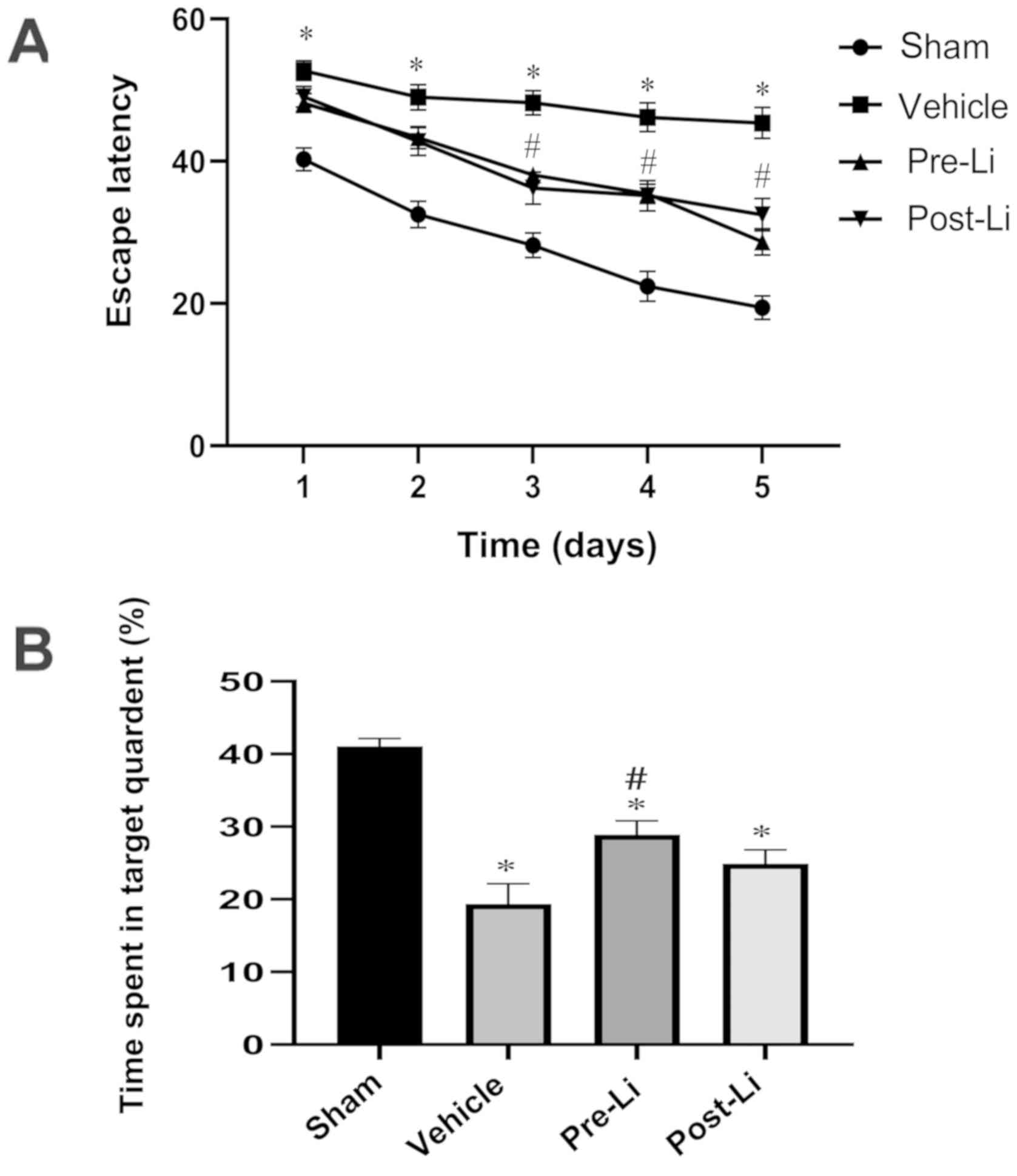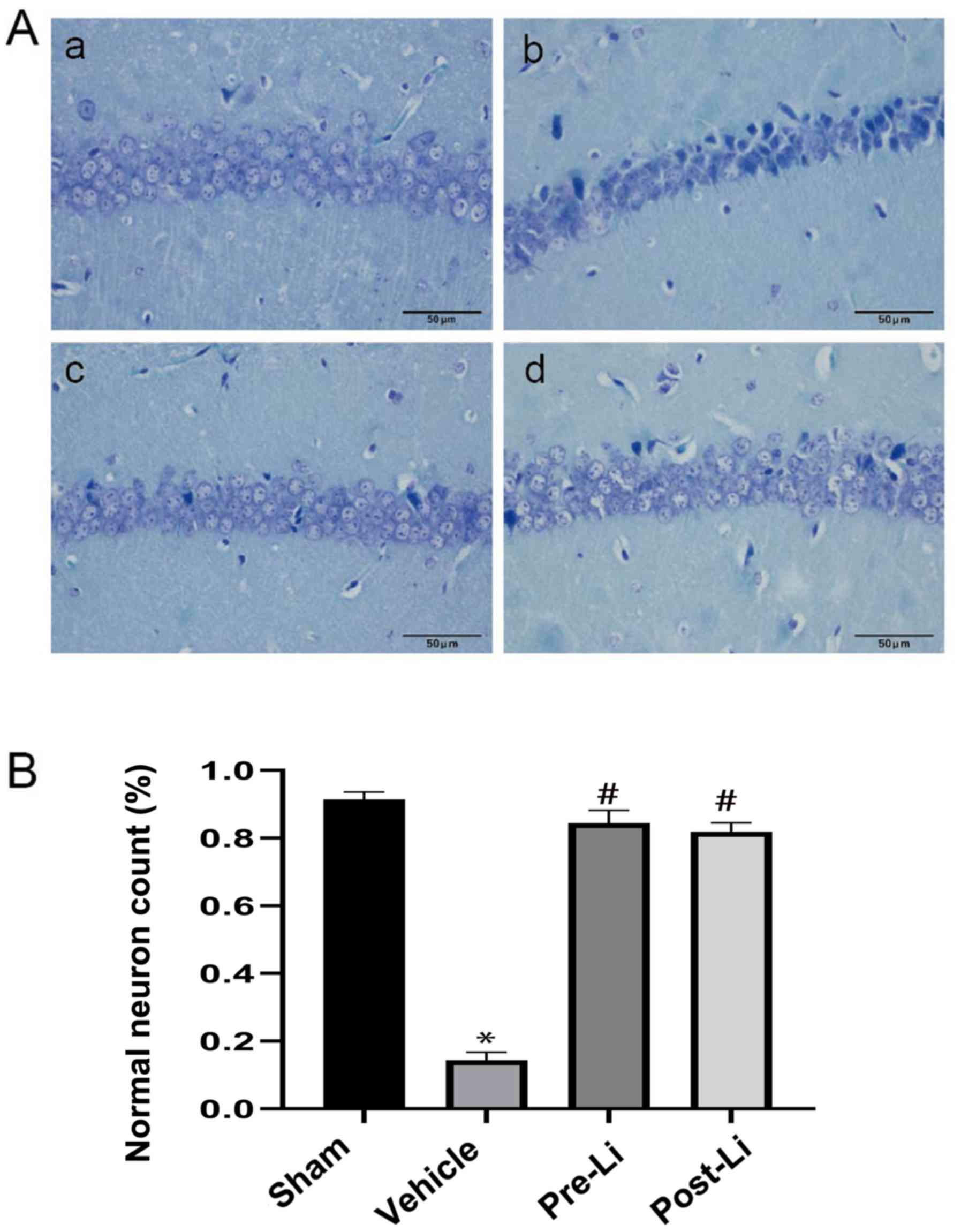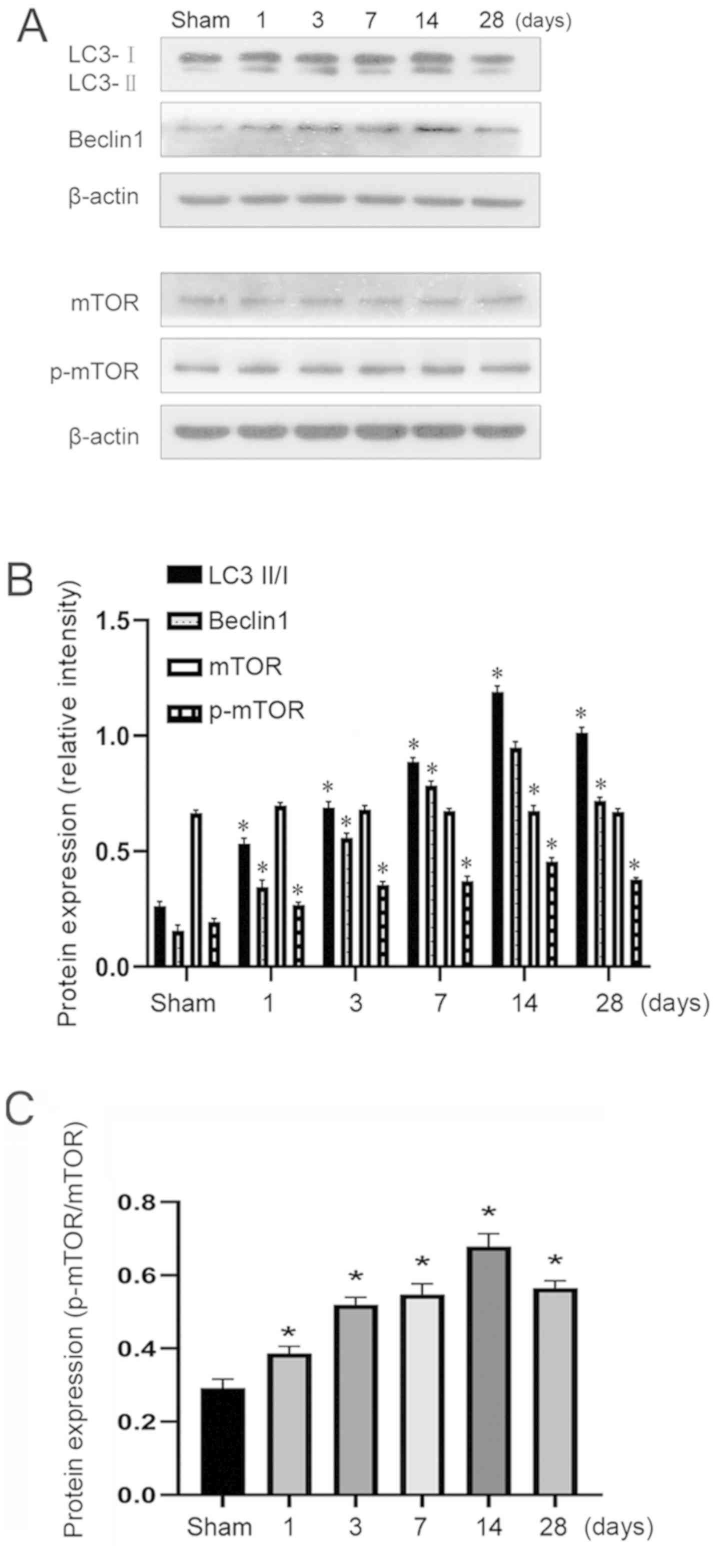|
1
|
Chatauret N, Badet L, Barrou B and Hauet
T: Ischemia-reperfusion: From cell biology to acute kidney injury.
Prog Urol. 24 (Suppl 1):S4–S12. 2014.PubMed/NCBI View Article : Google Scholar
|
|
2
|
Erfani S, Khaksari M, Oryan S, Shamsaei N,
Aboutaleb N, Nikbakht F, Jamali-Raeufy N and Gorjipour F: Visfatin
reduces hippocampal CA1 cells death and improves learning and
memory deficits after transient global ischemia/reperfusion.
Neuropeptides. 49:63–68. 2015.PubMed/NCBI View Article : Google Scholar
|
|
3
|
Huang XP, Tan H, Chen BY and Deng CQ:
Combination of total astragalus extract and total Panax notoginseng
saponins strengthened the protective effects on brain damage
through improving energy metabolism and inhibiting apoptosis after
cerebral ischemia-reperfusion in mice. Chin J Integr Med.
23:445–452. 2017.PubMed/NCBI View Article : Google Scholar
|
|
4
|
Guo C, Wang S, Duan J, Jia N, Zhu Y, Ding
Y, Guan Y, Wei G, Yin Y, Xi M and Wen A: Protocatechualdehyde
protects against cerebral ischemia-reperfusion-induced oxidative
injury via protein kinase Cepsilon/Nrf2/HO-1 Pathway. Mol
Neurobiol. 54:833–845. 2017.PubMed/NCBI View Article : Google Scholar
|
|
5
|
Zhang S, Zhang Y, Li H, Xu W, Chu K, Chen
L and Chen X: Antioxidant and anti-excitotoxicity effect of Gualou
Guizhi decoction on cerebral ischemia/reperfusion injury in rats.
Exp Ther Med. 9:2121–2126. 2015.PubMed/NCBI View Article : Google Scholar
|
|
6
|
Yaidikar L and Thakur S: Punicalagin
attenuated cerebral ischemia-reperfusion insult via inhibition of
proinflammatory cytokines, up-regulation of Bcl-2, down-regulation
of Bax, and caspase-3. Mol Cell Biochem. 402:141–148.
2015.PubMed/NCBI View Article : Google Scholar
|
|
7
|
Shintani T and Klionsky DJ: Autophagy in
health and disease: A double-edged sword. Science. 306:990–995.
2004.PubMed/NCBI View Article : Google Scholar
|
|
8
|
Kourtis N and Tavernarakis N: Autophagy
and cell death in model organisms. Cell Death Differ. 16:21–30.
2009.PubMed/NCBI View Article : Google Scholar
|
|
9
|
Lee JA: Neuronal autophagy: A housekeeper
or a fighter in neuronal cell survival? Exp Neurobiol Mar. 21:1–8.
2012.PubMed/NCBI View Article : Google Scholar
|
|
10
|
Shi R, Weng J, Zhao L, Li XM, Gao TM and
Kong J: Excessive autophagy contributes to neuron death in cerebral
ischemia. CNS Neurosci Ther. 18:250–260. 2012.PubMed/NCBI View Article : Google Scholar
|
|
11
|
Rami A, Langhagen A and Steiger S: Focal
cerebral ischemia induces upregulation of Beclin 1 and
autophagy-like cell death. Neurobiol Dis. 29:132–141.
2008.PubMed/NCBI View Article : Google Scholar
|
|
12
|
Wen YD, Sheng R, Zhang LS, Han R, Zhang X,
Zhang XD, Han F, Fukunaga K and Qin ZH: Neuronal injury in rat
model of permanent focal cerebral ischemia is associated with
activation of autophagic and lysosomal pathways. Autophagy.
4:762–769. 2008.PubMed/NCBI View Article : Google Scholar
|
|
13
|
Machado-Vieira R, Zanetti MV, DE Sousa RT,
Soeiro-DE-Souza MG, Moreno RA, Busatto GF and Gattaz WF: Lithium
efficacy in bipolar depression with flexible dosing: A six-week,
open-label, proof-of-concept study. Exp Ther Med. 8:1205–1208.
2014.PubMed/NCBI View Article : Google Scholar
|
|
14
|
Inoki K, Ouyang H, Zhu T, Lindvall C, Wang
Y, Zhang X, Yang Q, Bennett C, Harada Y, Stankunas K, et al: TSC2
integrates Wnt and energy signals via a coordinated phosphorylation
by MAPK and GSK3 to regulate cell growth. Cell. 126:955–968.
2006.PubMed/NCBI View Article : Google Scholar
|
|
15
|
Fan M, Song C, Wang T, Li L, Dong Y, Jin W
and Lu P: Protective effects of lithium chloride treatment on
repeated cerebral ischemia-reperfusion injury in mice. Neurol Sci.
36:315–321. 2015.PubMed/NCBI View Article : Google Scholar
|
|
16
|
Fan M, Jin W, Zhao H, Xiao Y, Jia Y, Yin
Y, Jiang X, Xu J, Meng N and Lv P: Lithium chloride administration
prevents spatial learning and memory impairment in repeated
cerebral ischemia-reperfusion mice by depressing apoptosis and
increasing BDNF expression in hippocampus. Behav Brain Res.
291:399–406. 2015.PubMed/NCBI View Article : Google Scholar
|
|
17
|
Ogden BE, Pang William W, Agui T and Lee
BH: Laboratory animal laws, regulations, guidelines and standards
in China mainland, Japan, and Korea. ILAR J. 57:301–311.
2016.PubMed/NCBI View Article : Google Scholar
|
|
18
|
Kilkenny C, Browne WJ, Cuthill IC, Emerson
M and Altman DG: Improving bioscience research reporting: The
ARRIVE guidelines for reporting animal research. Osteoarthritis
Cartilage. 20:256–260. 2012.PubMed/NCBI View Article : Google Scholar
|
|
19
|
Science and Technology in China. Nature
162: 17, 1948.
|
|
20
|
Vorhees CV and Williams MT: Morris water
maze: Procedures for assessing spatial and related forms of
learning and memory. Nat Protoc. 1:848–858. 2006.PubMed/NCBI View Article : Google Scholar
|
|
21
|
Wang JY, Xia Q, Chu KT, Pan J, Sun LN,
Zeng B, Zhu YJ, Wang Q, Wang K and Luo BY: Severe global cerebral
ischemia-induced programmed necrosis of hippocampal CA1 neurons in
rat is prevented by 3-methyladenine: A widely used inhibitor of
autophagy. J Neuropathol Exp Neurol. 70:314–322. 2011.PubMed/NCBI View Article : Google Scholar
|
|
22
|
Zheng Y, Hou J, Liu J, Yao M, Li L, Zhang
B, Zhu H and Wang Z: Inhibition of autophagy contributes to
melatonin-mediated neuroprotection against transient focal cerebral
ischemia in rats. J Pharmacol Sci. 12:354–364. 2014.PubMed/NCBI View Article : Google Scholar
|
|
23
|
Li L, Tian J, Long MK, Chen Y, Lu J, Zhou
C and Wang T: Protection against experimental stroke by Ganglioside
GM1 is associated with the inhibition of autophagy. PLoS One.
11(e0144219)2016.PubMed/NCBI View Article : Google Scholar
|
|
24
|
Chuang EH, Iwasaki K, Mishima K, Egashira
N and Fujiwara M: Repeated cerebral ischemia induced hippocampal
cell death and impairments of spatial cognition in the rat. Life
Sci. 72:609–619. 2002.PubMed/NCBI View Article : Google Scholar
|
|
25
|
Voss JL, Bridge DJ, Cohen NJ and Walker
JA: A Closer look at the hippocampus and memory. Trends Cogn Sci.
21:577–588. 2017.PubMed/NCBI View Article : Google Scholar
|
|
26
|
Wellons JC III, Sheng H, Laskowita DT,
Mackensen GB, Pearlstein RD and Warner DS: A comparison of
strain-related susceptibility in two murine recovery models of
global cerebral ischemia. Brain Res. 868:14–21. 2000.PubMed/NCBI View Article : Google Scholar
|
|
27
|
Fujii M, Hara H, Meng W, Vonsattel JP,
Huang Z and Moskowitz MA: Strain-related differences in
susceptibility to transient forebrain ischemia in SV-129 and
C57black/6 mice. Stroke. 28:1805–1810. 1997.PubMed/NCBI View Article : Google Scholar
|
|
28
|
Maeda K, Hata R and Hossmann KA: Regional
metabolic disturbances and cerebrovascular anatomy after permanent
middle cerebral artery occlusion in C57black/6 and SA129 mice.
Neurobiol Dis. 6:101–108. 1999.PubMed/NCBI View Article : Google Scholar
|
|
29
|
Wang T, Lv P, Jin W, Zhang H, Lang J and
Fan M: Protective effect of donepezil hydrochloride on cerebral
ischemia/reperfusion injury in mice. Mol Med Rep. 9:509–514.
2014.PubMed/NCBI View Article : Google Scholar
|
|
30
|
Fiorentini A, Rosi MC, Grossi C, Luccarini
I and Casamenti F: Lithium improves hippocampal neurogenesis,
neuropathology and cognitive functions in APP mutant mice. PLoS
One. 5(e14382)2010.PubMed/NCBI View Article : Google Scholar
|
|
31
|
Contestabile A, Greco B, Ghezzi D, Tucci
V, Benfenati F and Gasparini L: Lithium rescues synaptic plasticity
and memory in Down syndrome mice. J Clin Invest. 123:348–361.
2013.PubMed/NCBI View
Article : Google Scholar
|
|
32
|
Li N, Zhang X, Dong H, Zhang S, Sun J and
Qian Y: Lithium ameliorates LPS-induced astrocytes activation
partly via inhibition of toll-like receptor 4 expression. Cell
Physiol Biochem. 38:714–725. 2016.PubMed/NCBI View Article : Google Scholar
|
|
33
|
Zhu ZF, Wang QG, Han BJ and William CP:
Neuroprotective effect and cognitive outcome of chronic lithium on
traumatic brain injury in mice. Brain Res Bull. 83:272–277.
2010.PubMed/NCBI View Article : Google Scholar
|
|
34
|
Gold AB, Herrmann N and Lanctot KL:
Lithium and its neuroprotective and neurotrophic effects: Potential
treatment for post-ischemic stroke sequelae. Curr Drug Targets.
12:243–255. 2011.PubMed/NCBI View Article : Google Scholar
|
|
35
|
Yan XB, Hou HL, Wu LM, Liu J and Zhou JN:
Lithium regulates hippocampal neurogenesis by ERK pathway and
facilitates recovery of spatial learning and memory in rats after
transient global cerebral ischemia. Neuropharmacology. 53:487–495.
2007.PubMed/NCBI View Article : Google Scholar
|
|
36
|
Bian Q, Shi T, Chuang DM and Qian Y:
Lithium reduces ischemia-induced hippocampal CA1 damage and
behavioral deficits in gerbils. Brain Res. 1184:270–276.
2007.PubMed/NCBI View Article : Google Scholar
|
|
37
|
Adhami F, Liao G, Morozov YM, Schloemer A,
Schmithorst VJ, Lorenz JN, Dunn RS, Vorhees CV, Wills-Karp M, Degen
JL, et al: Cerebral ischemia-hypoxia induces intravascular
coagulation and autophagy. Am J Pathol. 169:566–583.
2006.PubMed/NCBI View Article : Google Scholar
|
|
38
|
Li WL, Yu SP, Chen D, Yu SS, Jiang YJ,
Genetta T and Wei L: The regulatory role of NF-κB in autophagy-like
cell death after focal cerebral ischemia in mice. Neuroscience.
244:16–30. 2013.PubMed/NCBI View Article : Google Scholar
|
|
39
|
Yang Y, Gao K, Hu Z, Li W, Davies H, Ling
S, Rudd JA and Fang M: Autophagy upregulation and apoptosis
downregulation in DAHP and triptolide treated cerebral ischemia.
Mediators Inflamm. 2015(120198)2015.PubMed/NCBI View Article : Google Scholar
|
|
40
|
Zheng YQ, Liu JX, Li XZ, Xu L and Xu YG:
RNA interference- mediated downregulation of Beclin1 attenuates
cerebral ischemic injury in rats. Acta Pharmacol Sin. 30:919–927.
2009.PubMed/NCBI View Article : Google Scholar
|
|
41
|
Yang Z, Zhong L, Zhong S, Xian R and Yuan
B: Hypoxia induces microglia autophagy and neural inflammation
injury in focal cerebral ischemia model. Exp Mol Pathol.
98:219–224. 2015.PubMed/NCBI View Article : Google Scholar
|
|
42
|
Laplante M and Asbatini DM: mTOR signaling
in growth control and disease. Cell. 149:274–293. 2012.PubMed/NCBI View Article : Google Scholar
|
|
43
|
Zhou J, Tan SH Nicolas V, Bauvy C, Yang
ND, Zhang J, Xue Y, Codogno P and Shen HM: Activation of lysosomal
function in the course of autophagy via mTORC1 suppression and
autophagosome-lysosome fusion. Cell Res. 23:508–523.
2013.PubMed/NCBI View Article : Google Scholar
|
|
44
|
Wullschleger S, Loewith R and Hall MN:
mTOR signaling in growth control and disease. Cell. 124:471–484.
2006.
|
|
45
|
Jung CH, Ro SH, Cao J, Otto NM and Kim DH:
mTOR regulation of autophagy. FEBS Lett. 584:1287–1295.
2010.PubMed/NCBI View Article : Google Scholar
|
|
46
|
Chi OZ, Mellender SJ, Barsoum S, Liu X,
Damito S and Weiss HR: Effects of rapamycin pretreatment on
blood-brain barrier disruption in cerebral ischemia-reperfusion.
Neurosci Lett. 620:132–136. 2016.PubMed/NCBI View Article : Google Scholar
|
|
47
|
Fu L, Huang L, Cao C, Yin Q and Liu J:
Inhibition of AMP-activated protein kinase alleviates focal
cerebral ischemia injury in mice: Interference with mTOR and
autophagy. Brain Res. 1650:103–111. 2016.PubMed/NCBI View Article : Google Scholar
|
|
48
|
Puyal J, Vaslin A, Mottier V and Clarke
PG: Postischemic treatment of neonatal cerebral ischemia should
target autophagy. Ann Neurol. 66:378–389. 2009.PubMed/NCBI View Article : Google Scholar
|
|
49
|
Wang PR, Wang JS, Zhang C, Song XF, Tian N
and Kong LY: Huang-Lian-Jie-Du-Decotion induced protective
autophagy against the injury of cerebral ischemia/reperfusion via
MAPK-mTOR signaling pathway. J Ethnopharmacol. 149:270–280.
2013.PubMed/NCBI View Article : Google Scholar
|


















